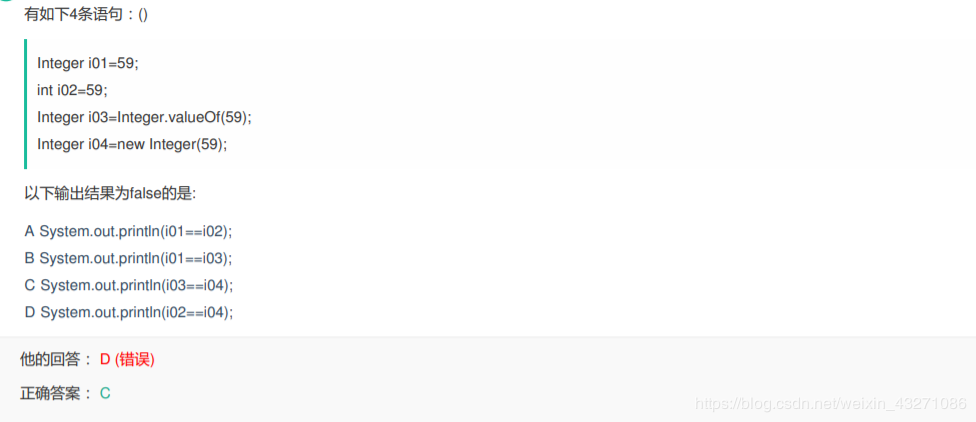Java Integer.ValueOf()的一些了解
本文是對 Integer.ValueOf()的一些了解,分享給大家

這道題有的人或許做過,也可能選對,但是這其中的道理你卻不一定理解,在這里大牛走過,小白留下一起學習。

先來分析選型A,Integer i01 = 59,是一個裝箱的過程,在進行i01 == i02的比較過程中,因為右邊是整型,發生了拆箱的動作,所以進行了值得比較,所以返回true。
在這里拿出Integer a = 59,Integer b = 59,這種又會出現什么狀況呢,如果按照裝箱和拆箱來看就是true,如果按照對象來看,就是false,在你舉棋不定得時候你就應該看看源碼了。
/** * Cache to support the object identity semantics of autoboxing for values between * -128 and 127 (inclusive) as required by JLS. * * The cache is initialized on first usage. The size of the cache * may be controlled by the {@code -XX:AutoBoxCacheMax=<size>} option. * During VM initialization, java.lang.Integer.IntegerCache.high property * may be set and saved in the private system properties in the * sun.misc.VM class. */ private static class IntegerCache { static final int low = -128; static final int high; static final Integer cache[]; static { // high value may be configured by property int h = 127; String integerCacheHighPropValue =sun.misc.VM.getSavedProperty('java.lang.Integer.IntegerCache.high'); if (integerCacheHighPropValue != null) {try { int i = parseInt(integerCacheHighPropValue); i = Math.max(i, 127); // Maximum array size is Integer.MAX_VALUE h = Math.min(i, Integer.MAX_VALUE - (-low) -1);} catch( NumberFormatException nfe) { // If the property cannot be parsed into an int, ignore it.} } high = h; cache = new Integer[(high - low) + 1]; int j = low; for(int k = 0; k < cache.length; k++)cache[k] = new Integer(j++); // range [-128, 127] must be interned (JLS7 5.1.7) assert IntegerCache.high >= 127; } private IntegerCache() {} }
這個類是Integer類中的一個靜態內部類,其中的靜態代碼塊在類進行加載的時候就進行了-127-128這些數字的創建和保存,將他們的引用全部保存在Cache數組中。
所以當用Integer 聲明初始化變量時,會先判斷所賦值的大小是否在-128到127之間,若在,則利用靜態緩存中的空間并且返回對應cache數組中對應引用,存放到運行棧中,而不再重新開辟內存。
這里你就懂了吧,Integer a = 59,Integer b = 59返回的就是true,Integer a = 300,Integer b = 300在判斷完之后就會new出來一個新的對象,所以會返回false。

我們來分析B選項,我們先來看Value的代碼。
* @param i an {@code int} value. * @return an {@code Integer} instance representing {@code i}. * @since 1.5 */ public static Integer valueOf(int i) { if (i >= IntegerCache.low && i <= IntegerCache.high) return IntegerCache.cache[i + (-IntegerCache.low)]; return new Integer(i);
和上面的一樣,int進去之后首先進行判斷,如果在-128-127之間就會返回引用,否則就在堆上new出來對象。所以B選項返回true。

C選項i03返回的是Cache數組中的引用,而i04返回的是堆上對象的引用,所以返回的是false。

System.out.println(i02== i04) i02是整型變量,i04是引用,這里又用到了解包,虛擬機會把i04指向的數據拆箱為整型變量再與之比較,所以比較的是數值,59==59,返回true.
到此這篇關于Java Integer.ValueOf()的一些了解的文章就介紹到這了,更多相關Java Integer.ValueOf()內容請搜索好吧啦網以前的文章或繼續瀏覽下面的相關文章希望大家以后多多支持好吧啦網!
相關文章:

 網公網安備
網公網安備